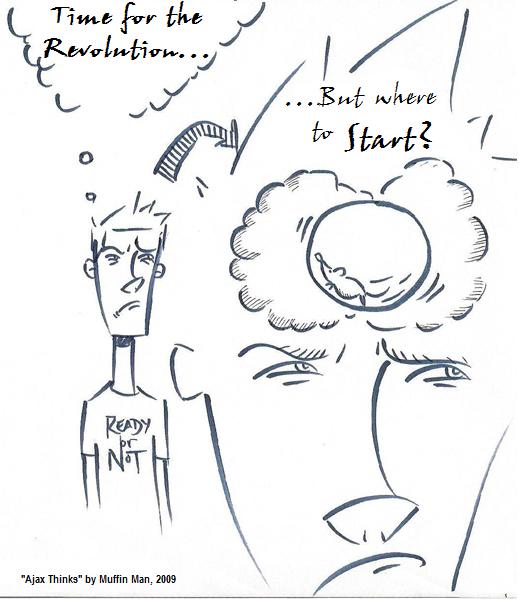Homer Simpson once joined the Navy reserve. In comical fashion he found himself having dinner with the Commander of the submarine he was serving on. The Commander asked Homer what he wanted more than anything else. Homer, with a bowl of peas, just out of reach, responded "Peas." The Commander, hearing "peace" was thrilled, and asked how Homer expected to get it, to which he responded "with a knife!" He then used a knife to retrieve some peas from the bowl. The gag continues, but that should be sufficient for explaining the title of this post. Now on to explaining the body of the post.
What follows is my response to a discussion question in my online Social and Cultural Psychology class. This week is the final and then another class is finished along my Master's pathway. The question was regarding optimistic and pessimistic views of the possibility of global unity. Here is my response copied directly over from the discussion board wall:
I really wish I would have kept one of my books from a sociology class a few years ago. The book was by John Turner and in it he mapped out his theory of racial discrimination. He had a flow chart in the book that showed how discrimination lead to identifiability, which eventually lead to increased discrimination. I’ve always found this to be fascinating because to me it means that the more we focus on the differences and how they need to be accepted, we inadvertently increased the separation. You can’t glue a broken vase back together by focusing on how broken the pieces are, you have to get some glue and put the pieces back together. Typically you’ll need some sort of brace as well to hold it in place as the glue dries.
Now with global unity we can look at it in the model of a broken vase. It is an easy comparison to visualize with the jagged property lines between states and countries across the globe. We are all people, but we don’t focus on that; we don’t focus on the glued together vase, we simply keep to our own broken piece of porcelain and focus on how broken the rest of the vase is in comparison to our little intact piece. Many countries want to get the vase back together, but not for the sake of getting the vase back together, but rather in order to increase the size of their piece.
Lately I’m finding myself to be very pessimistic although I feel that I am a generally hopeful person. I don’t believe I am a “downer” to other people. People seem to be generally entertained by me, so I don’t consider myself a pessimist or depressing person. But my point of view regarding global unity would probably be classified as pessimistic. I believe that since we are all humans, we share a really strong bond of commonality. Global unity takes more than a familial tie, however. Global unity is going to require a great deal of compromise. As we have just discussed the differences and similarities between cultures based on Hofstede’s values, we see that there are some dramatic differences in cultural motivations and practices.
A culture that believes in a central government that governs the masses is going to have a tough time melding with a culture that believes that the family governs itself and neighbors simply coexist in peace, because they do, without government intervention. Likewise, cultures where women are beneath men, and baby girls are sacrificed to vain pride of the parents, will clash with cultures where human life is respected and all children, all genders are celebrated just because they are of our human family (although it seems like these types of countries are fewer and fewer these days). These types of differences in culture and other differences that are more extreme can’t coexist in peace. One or the other has to give if the two are going to coexist. The question then becomes which aspect of each culture has to yield and which aspect gets to thrive?
Why is global unity difficult to imagine? Because there is too much selfish pride in the world. Until this is eradicated cultures will remain broken pieces of a vase. Focusing on the broken pieces of the vase will never get it back together. Some of the unique aspects of those broken pieces will need to be lost in order to reunite into one vase again. Assimilation is necessary to form one united culture. I don’t expect to see this happen without a very influential uniting factor, such as war, disease, famine, or love. I think it would be great for the world to unite in love, but I don’t think it will happen without some huge shifts in current trends. Until we have a global uniting factor, a common belief, I don’t see it happening. We already share the same blood, which is a pretty intimate connection, but that hasn’t been enough for the world to see past skin color and eye shape. As unpopular and divisive sounding as my opinion is, I don’t believe unity will exist until the focus on differences is abandoned and the focus on similarities embraced. Please note I said “the focus on” and not the differences themselves. I am not supporting a culture of clones, but rather a culture of individuals with common goals and ideals. I think if people would forget themselves just a little bit, and reduce their need for competition, they would find that there are some basic beliefs we could all agree on without losing individuality and creativity.
Date Tricks for Guys that Truly Work
5 years ago

